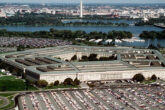December 19, 2022
The ‘Arsenal of Democracy’ Is in Peril
The U.S. was once known as “the arsenal of democracy,” for its ability to build enough weapons not only for itself but also for its allies. In recent decades, that moniker hasn’t been as fitting. The American defense industrial base has consolidated since the end of the Cold War—especially for munitions and missiles—leaving it unable to meet U.S. military requirements, let alone those of its allies and partners. But as William LaPlante, undersecretary of defense for acquisition and sustainment, said in October, “production is deterrence.” If the U.S. is to compete with China and Russia, its production capacity needs to change quickly.
As Ukraine’s valiant fight has shown, wars against great powers are rarely won quickly and the price of freedom is high.
The war in Ukraine has underscored the extent of U.S. foreign commitments and the present limits of industry. Washington has sent more than $19 billion in security assistance to Kyiv since February, including thousands of long-range rockets and missiles and millions of shells from the Pentagon’s own supplies. These drawdowns have helped the Ukrainians fend off the Russians, but they’ve also depleted U.S. stocks and impaired our military’s preparedness for war.
It will take years, for example, for the U.S. to replace the 1,600 Stinger antiaircraft missiles it’s given to Ukraine, because Stinger production stopped in 2003. Raytheon, the sole producer of these weapons, began to revive the dormant Stinger line this spring in response to the war. But material is limited and large numbers of the shoulder-fired missiles won’t be available until late 2023 or 2024.
Read the full story and more from the Wall Street Journal.
More from CNAS
-
DEFAERO Strategy Series [Apr 09, 25] CNAS' Becca Wasser and Phil Sheers on Revitalizing the U.S. Defense Industrial Base
On this episode of the Defense & Aerospace Report Strategy Series, sponsored by General Atomics Aeronautical Systems, Becca Wasser and Phil Sheers of the Center for a New Amer...
By Becca Wasser & Philip Sheers
-
From Production Lines to Front Lines
Executive Summary The U.S. defense industrial base (DIB) is struggling to meet the demands of the current strategic environment—let alone prepare for a potential conflict agai...
By Becca Wasser & Philip Sheers
-
The Pentagon’s Endangered Brain Trust
In this environment, sound assessments of emerging threats and new ideas to counter them will be especially vital....
By Dr. Andrew Krepinevich, Jr.
-
Siliconsciousness: The AI Competition: Public Policy Strategies: Part 1
This episode comprises the first part of our special event, “The AI Competition: Public Policy Strategies”. The event, co-hosted by MIT Technology Review, brings together some...
By Dr. ED McGrady




